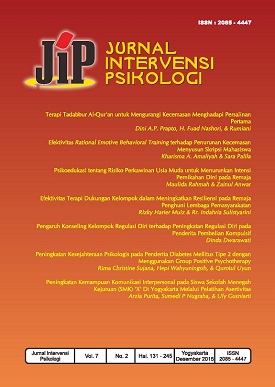Main Article Content
Abstract
This study aims to determine the effectiveness of support group therapy on improving resilience among adolescents in prisons. The hypothesis tested was based on the asumption that support group therapy influenced to improving resilience of adolescents in prison. The sample include 12 convicts adolescents, consist of male, they were between 16 and 18 years old, and classified into two groups, the two groups are experiment and control group. Data were collected by resilience scale (38-aitem) which refers to resilient aspects from Connor and Davidson (2003). The effectiveness of intervention was evaluated by using a quasi-experimental design with pretest-posttes and follow-up analysis. Analysis of this study consisted of quantitative and qualitative analysis. Quantitative analysis using parametric analysis of Anova Repeated Measures to determine differences in resilience to experimental group and control group after the subjects are given therapy. The qualitative analysis was done based on observations and interviews. The result of research showed there were differences in resilience between experimental group and control group after the therapy given, with value of p = 0.019 (p<0.05) when pretest-posttest and p = 0.013 (p<0.05) when pretest-follow up. The conclusion of this study was support group therapy can enhance resilience of adolescents in prisons.
Key words: Support group therapy, Resilience, Adolescents.
Article Details
Authors who publish with this journal agree to the following terms:
- Authors retain copyright and grant the journal right of first publication with the work simultaneously licensed under a Creative Commons Attribution-ShareAlike 4.0 International License that allows others to share the work with an acknowledgment of the work's authorship and initial publication in this journal.
- Authors are able to enter into separate, additional contractual arrangements for the non-exclusive distribution of the journal's published version of the work (e.g., post it to an institutional repository or publish it in a book), with an acknowledgment of its initial publication in this journal.
- Authors are permitted and encouraged to post their work online (e.g., in institutional repositories or on their website) prior to and during the submission process, as it can lead to productive exchanges, as well as earlier and greater citation of published work (See The Effect of Open Access).




